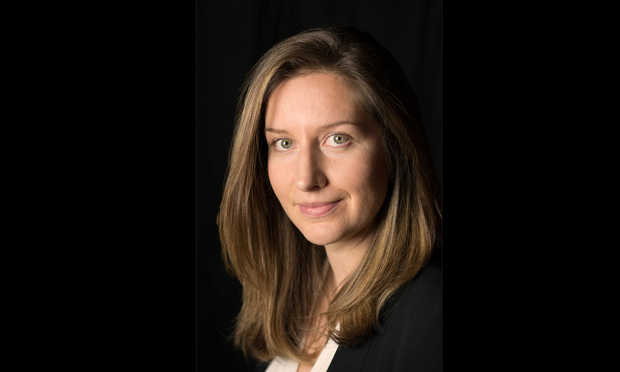On Appeals: The Surprising Humanity of Remote Work
We talk a lot about when things might "return to normal." In the context of law practice, it may be worth asking whether they should.
July 24, 2020 at 07:40 PM
6 minute read
 Susan Yorke, California Appellate Law Group. (Courtesy photo)
Susan Yorke, California Appellate Law Group. (Courtesy photo)
Law is a famously formal profession. That formality is enshrined in all sorts of ways—special titles for attorneys and judges, strict dress codes in the office and in court, ritualized oaths and cries, the banging of the gavel. At a time when first names, ping pong tables, and hoodies are de rigueur in most other professions, the law is strikingly anachronistic.
Before COVID-19, the legal profession as a whole did not appear to be in any hurry to catch up. In many ways, that makes perfect sense. Large law firms have rigid structures that make them slow to embrace new ways of working. And the law itself derives respect in part from the performance of ritual. Hushed courtrooms reflect the gravity of the difficult work that's done inside those walls, and formalities preserve the institutional identities of advocates and judges.
A small handful of firms did embrace more flexible approaches to work early on. My firm, the California Appellate Law Group, is one of those few, so I've been privileged to work remotely for the past several years. This has afforded me significant freedom, both in managing my day-to-day life and in getting to see more of the world (I'm writing this from Japan!).
But the pandemic marks the first time that remote work has been systemwide. Now opposing counsel, clients and judges are all appearing from home. And that's provided an opportunity to think about new ways of doing legal work and gain insight into some of the legal traditions that perhaps no longer serve us.
Many of the formalities of legal practice serve to obscure the individuality of actors within the system. This is intentional—legal disputes are not supposed to be about the lawyers or judges who help resolve them. But the impersonal nature of many interactions—combined with the significant pressures of the profession—can create an ethos that discourages participation, devalues empathy, and perpetuates entrenched hierarchies.
The pandemic has broken down some of those formalities. To be sure, remote meetings, hearings and arguments have their foibles. Toilets are flushed at historic and inopportune times. Sound quality may be poor, and visual cues may be harder to read. It can be difficult to know when to start talking and when to stop. There may be privacy concerns, embarrassing gaffes, and technological impediments.
But remote work has also offered us a window into our professional colleagues' lives. We see now that opposing counsel has a young child to care for, or that our quiet co-worker has a quirky and expressive interior decorating style. The guitar leaning against the living room wall or the unruly pet bounding into view show us aspects of each other that we might not discover in a traditional office setting. These snapshots of life serve as a reminder that each of us is a multifaceted person, with an identity and a set of concerns and interests outside of our existence as a lawyer.
Remote appellate arguments, in particular, may have some surprising advantages in terms of reflecting our shared humanity. The design of the physical courtroom is intended to create a sense of solemnity, formality, and hierarchy. Judges are elevated above counsel and the public, placed at a distance from the lectern and audience. Counsel tables are on opposite sides of the room in front of the gallery. Appellate practitioners are constantly advised to maintain a conversational tone during argument, but how often do you have a casual conversation with someone who's 15 feet away and 5 feet above you, while a gaggle of onlookers watch you from behind?
In a video argument, the judges don't loom from the bench. Remote meeting technology is a great equalizer—we're all just boxes on a screen. For new attorneys or those prone to stage fright, remote arguments may encourage participation and help foster the natural dynamic that judges and advocates prefer. Indeed, the video arguments I've seen over the past few months have—technological hiccups aside—tended to be more conversational in tone.
Of course, advocates should continue to maintain some level of formality. Wear a suit (top and bottom!), use a non-distracting background, address judges by their titles, and don't interrupt. Still, a remote argument really can feel more like a conversation (after all, we chat with our friends on Zoom all the time now), and that helps judges get the information they need to decide their cases.
Remote arguments also decrease the price of the proverbial "day in court." For far-flung clients, having the option of a video argument can make a real financial difference. And for public-sector or nonprofit attorneys with limited budgets, eliminating the burden of travel saves time and money and may allow more lawyers to participate in arguments.
We talk a lot about when things might "return to normal." In the context of law practice, it may be worth asking whether they should. Having the option to work remotely affords lawyers greater flexibility and more time with their families. Holding oral arguments by video reduces travel costs for courts and clients alike and may well encourage broader participation by a younger and more diverse set of attorneys. These benefits are worth taking into account.
But even if things do return to normal, we'd be wise to take some of the lessons from the pandemic with us. Our colleagues, judges and opposing counsel are all people, with boisterous kids and noisy puppies and messy homes. If we gain one professional insight from the experience of COVID-19, I hope it's that we can zealously represent our clients while holding space for the humanity of our fellow lawyers.
On Appeals is a monthly column by the attorneys of the California Appellate Law Group, an appellate boutique with offices in San Francisco, Los Angeles and San Diego. Susan Yorke is of counsel with the firm. She served as a law clerk on the Ninth Circuit for two judges and in the Appellate Division of the Oregon Department of Justice. Find out more about Yorke and the California Appellate Law Group at www.calapplaw.com.
This content has been archived. It is available through our partners, LexisNexis® and Bloomberg Law.
To view this content, please continue to their sites.
Not a Lexis Subscriber?
Subscribe Now
Not a Bloomberg Law Subscriber?
Subscribe Now
NOT FOR REPRINT
© 2025 ALM Global, LLC, All Rights Reserved. Request academic re-use from www.copyright.com. All other uses, submit a request to [email protected]. For more information visit Asset & Logo Licensing.
You Might Like
View AllTrending Stories
- 1'It's Not Going to Be Pretty': PayPal, Capital One Face Novel Class Actions Over 'Poaching' Commissions Owed Influencers
- 211th Circuit Rejects Trump's Emergency Request as DOJ Prepares to Release Special Counsel's Final Report
- 3Supreme Court Takes Up Challenge to ACA Task Force
- 4'Tragedy of Unspeakable Proportions:' Could Edison, DWP, Face Lawsuits Over LA Wildfires?
- 5Meta Pulls Plug on DEI Programs
Who Got The Work
Michael G. Bongiorno, Andrew Scott Dulberg and Elizabeth E. Driscoll from Wilmer Cutler Pickering Hale and Dorr have stepped in to represent Symbotic Inc., an A.I.-enabled technology platform that focuses on increasing supply chain efficiency, and other defendants in a pending shareholder derivative lawsuit. The case, filed Oct. 2 in Massachusetts District Court by the Brown Law Firm on behalf of Stephen Austen, accuses certain officers and directors of misleading investors in regard to Symbotic's potential for margin growth by failing to disclose that the company was not equipped to timely deploy its systems or manage expenses through project delays. The case, assigned to U.S. District Judge Nathaniel M. Gorton, is 1:24-cv-12522, Austen v. Cohen et al.
Who Got The Work
Edmund Polubinski and Marie Killmond of Davis Polk & Wardwell have entered appearances for data platform software development company MongoDB and other defendants in a pending shareholder derivative lawsuit. The action, filed Oct. 7 in New York Southern District Court by the Brown Law Firm, accuses the company's directors and/or officers of falsely expressing confidence in the company’s restructuring of its sales incentive plan and downplaying the severity of decreases in its upfront commitments. The case is 1:24-cv-07594, Roy v. Ittycheria et al.
Who Got The Work
Amy O. Bruchs and Kurt F. Ellison of Michael Best & Friedrich have entered appearances for Epic Systems Corp. in a pending employment discrimination lawsuit. The suit was filed Sept. 7 in Wisconsin Western District Court by Levine Eisberner LLC and Siri & Glimstad on behalf of a project manager who claims that he was wrongfully terminated after applying for a religious exemption to the defendant's COVID-19 vaccine mandate. The case, assigned to U.S. Magistrate Judge Anita Marie Boor, is 3:24-cv-00630, Secker, Nathan v. Epic Systems Corporation.
Who Got The Work
David X. Sullivan, Thomas J. Finn and Gregory A. Hall from McCarter & English have entered appearances for Sunrun Installation Services in a pending civil rights lawsuit. The complaint was filed Sept. 4 in Connecticut District Court by attorney Robert M. Berke on behalf of former employee George Edward Steins, who was arrested and charged with employing an unregistered home improvement salesperson. The complaint alleges that had Sunrun informed the Connecticut Department of Consumer Protection that the plaintiff's employment had ended in 2017 and that he no longer held Sunrun's home improvement contractor license, he would not have been hit with charges, which were dismissed in May 2024. The case, assigned to U.S. District Judge Jeffrey A. Meyer, is 3:24-cv-01423, Steins v. Sunrun, Inc. et al.
Who Got The Work
Greenberg Traurig shareholder Joshua L. Raskin has entered an appearance for boohoo.com UK Ltd. in a pending patent infringement lawsuit. The suit, filed Sept. 3 in Texas Eastern District Court by Rozier Hardt McDonough on behalf of Alto Dynamics, asserts five patents related to an online shopping platform. The case, assigned to U.S. District Judge Rodney Gilstrap, is 2:24-cv-00719, Alto Dynamics, LLC v. boohoo.com UK Limited.
Featured Firms
Law Offices of Gary Martin Hays & Associates, P.C.
(470) 294-1674
Law Offices of Mark E. Salomone
(857) 444-6468
Smith & Hassler
(713) 739-1250










